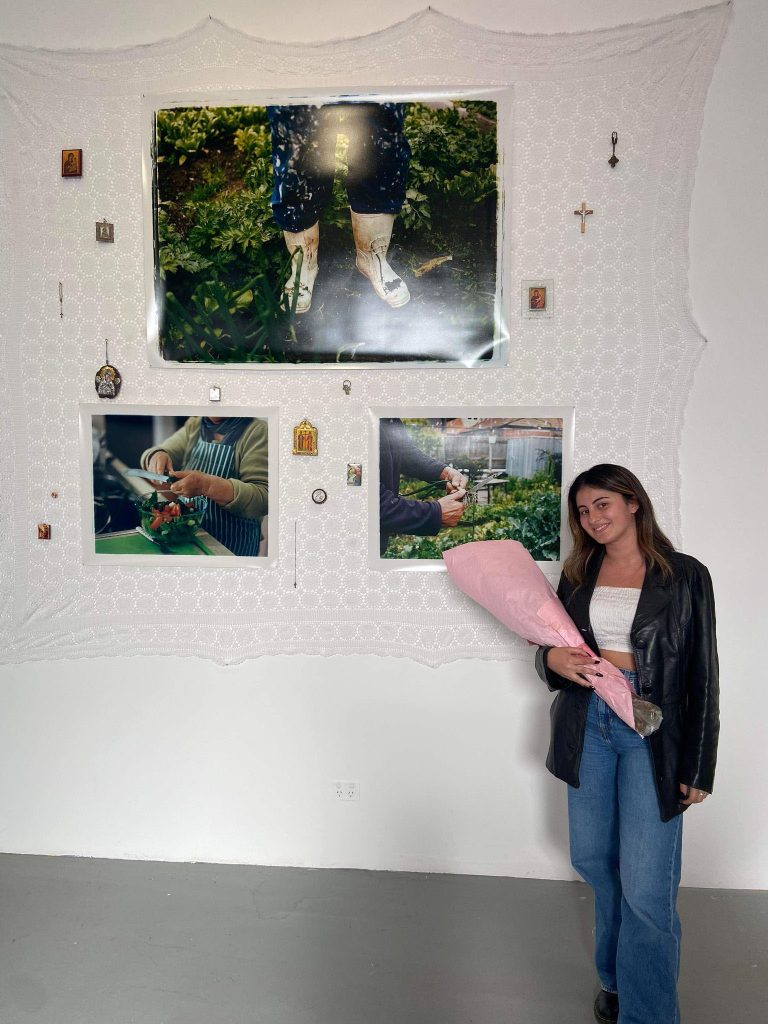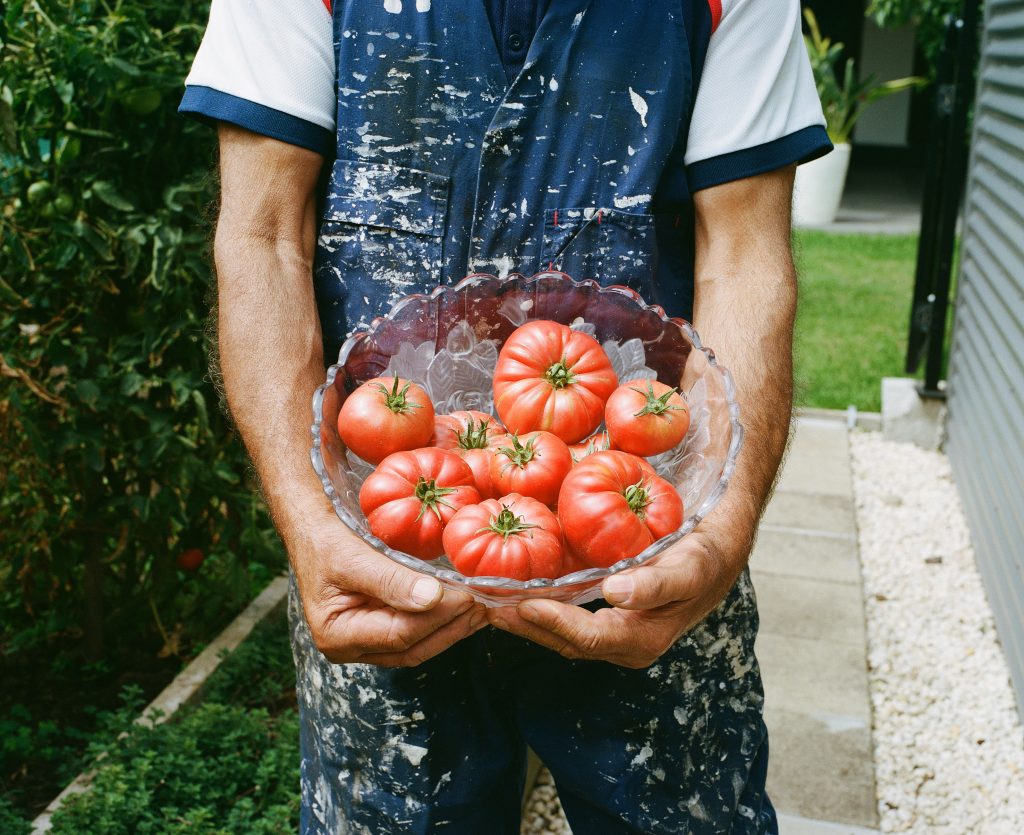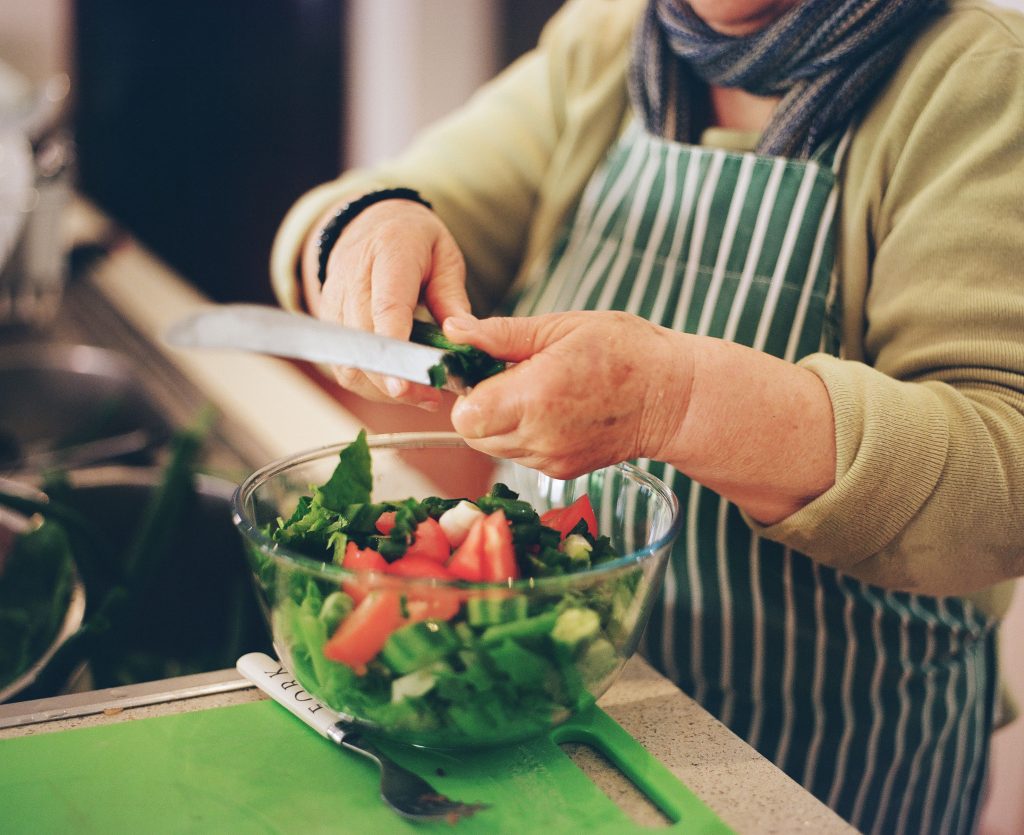By Marianna Alepidis
Without dwelling too far into the reality that our elders, who now look upon two or perhaps three generations of Greek Australians, are coming to the later stages of life, it is imperative that their contribution to our lives is preserved.
Demi Kromidellis is finding her own way of “personally archiving” her grandparents’ story of immigration and the culture they handed down to her, informing her Greek heritage.
The young photographer has been developing her ever-evolving series, Pride; a snapshot of her paternal yiayia Despina’s and pappou Fotios’ garden in Victoria.

“My grandparents migrated from Greece to leave the farming lifestyle. My pappou always said ‘we left for a better life, for more jobs, we didn’t want to farm for the rest of our lives.’ I always thought it was interesting that they came here, and yet they’ve transformed their whole entire backyard into a vegetable garden. They’ve brought it with them,” Kromidellis said.
“Initially, when I was creating this piece, it was all about childhood. I was thinking of Greek families, and what that meant to me. Then as I was progressing with creating it, I realised this is their form of belonging in Australia, this is what brings them back home to Greece.”

Her series features photographic colour darkroom prints, captured on medium format film. Almost 200 years after its inception, despite all kinds of digital invention in the meantime, it is this age-old method that has engulfed Kromidellis’ passion.
There are parallels to be drawn between the way the 21-year-old works to produce her photos and the way her grandparents have cultivated and nurtured their garden with the perfect produce.
Kromidellis spends hours taking her exposed film to the dark room, carefully tending to each frame, feeding the paper through a chemical processing machine which helps her mix the chemicals before coming out the other end dried, and ready to show the world.

“There’s something about the whole ‘this is mine, I made this.’ I was in control of the colours, the vibrancy. It’s also the physicality of transferring from film. I’m a very tactile person,” she explained.
Late last year, the photographer shared the fruits of her labour as part of a Victorian College of the Arts exhibition.
Kromidellis featured Pride as part of an installation she titled My Yiayia and Pappou’s Home. Her photographs adorn yiayia Despina’s crocheted tablecloth, and are surrounded by heirlooms of icons and trinkets handed down by her maternal yiayia, Eleni and pappou Panayiotis.
“For me the tablecloth symbolises food and coming together at the table. The tablecloth itself is a symbol for so many ethnic families,” she said.

“The icons and necklaces are all familiar representations of our lives and our environment, and I wanted to create an invitation into their homes. I used the photo of pappou cutting the spring onion in the garden and then yiayia cutting the same spring onions into the salad, getting ready to serve it. It’s a very nurturing, very inviting vibe of ‘come and eat with us, come join us in our home’.”
Naturally, yiayia Despina and pappou Fotios joined the family in viewing the installation. Kromidellis details how when taking the photos in their home, they were perplexed by her subject matter, but happily obliged.
“They did not understand why I was taking photos of them. Photography to them wasn’t really something they saw as art. Art to them was painting and sculpture. They’d ask, ‘why are you taking photos of the kypo (garden)?’” she said.
In visiting each day, following in their stride, she challenged their idea of art and ultimately won them over.
“Once it was all pieced together and in the space among other artwork, it clicked for them. When it clicked for them, it was like the final puzzle piece fell into place for me too. Yiayia got emotional, it was heartwarming to see them understand my work.”
Kromidellis touched the memories of other exhibition goers too. There is a collective experience many ethnic immigrant families, Greek or otherwise, connect to.

Whilst the photographer found herself enamoured by other artists who had captured the immigrant experience, namely Wang Ningde’s Some Days, she too had created a similar sentiment with her own work.
“It was connecting with a lot of people. Someone at the exhibition came up to me and told me, ‘I’m Croatian and this really resonated with me, it reminds me of my grandparents.’ I’m able to reinforce and immerse myself into my Greek heritage, whilst trying to present it in a new way and share my experiences,” she explained.
Kromidellis has a vision to continue growing Pride as a series, trudging through more gardens and sharing the stories of other Greek immigrants who made the uncertain and at times exciting journey across the world, bringing with them a little piece of home.
You can view more of her work on Instagram at @demkrom.

